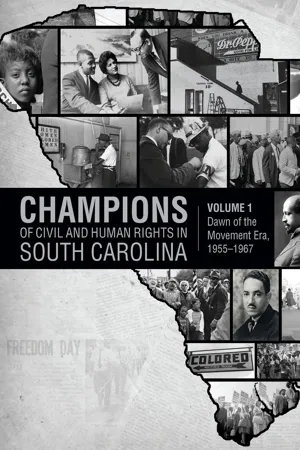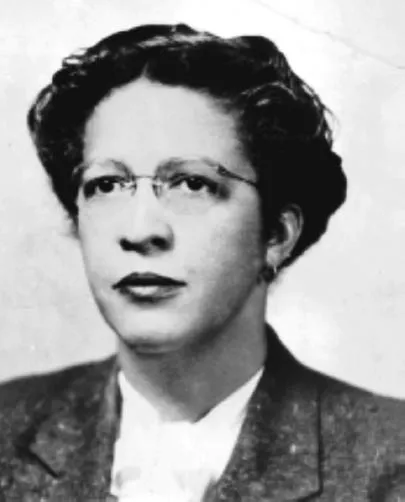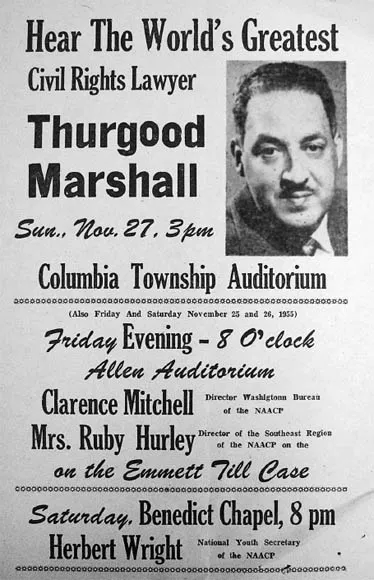![]()
PART 1
Following the 1954 Supreme Court Ruling: The Setting
![]()
The S.C. (Negro) Citizens Committee Press Release
November 6, 1955
(Dear Editor: Due To The Unfortunate Misunderstandings Of The Negro Citizens, We Kindly Request That You Carry This Statement In Full, APW.)*
From: A. P. Williams, Chairman, Interim Committee
Richland County Division, S.C. Citizens Committee
1808 Washington Street
2—9573, Columbia
Current Organizational Sentiment And Objectives Outlined
The Richland County Division of the South Carolina Citizens Committee held its first meeting of 1955–’56 in the auditorium of Allen University on Sunday, November 6 [1955]. Officers elected were The Rev. J. P. Reeder, president; I. P. Stanback, vice-president; the Rev. Arthur T. Fisher, secretary; Mrs. Rosena Benson, assistant secretary; the Rev. John R. Wilson, treasurer; and A. P. Williams, chairman of the interim committee.
Quoted below is a statement issued at the close of the meeting,
“We, the members of the Citizens Committee of Columbia and Richland County, a local unit of the South Carolina Citizens Committee, organized in 1944 to meet momentous problems facing the Negro citizens at that time, and working subsequently in various areas through political action and other civic movements, issue the following statement as to current sentiment and objectives:
“Our organization, having a composite representation from various religious and lay groups stands solidly for the respect and observance of all laws—national, state and local. We would have it clearly understood that we include the United States Supreme Court Decision of May 17, 1954 which declared that ‘in the field of public education the field of public education [sic] the doctrine of SEPARATE BUT EQUAL has no place;’ and the implementing document of May 31, 1955. We felt in May, 1954 what time has proved to be true: that the May 17 decision would become precedent for many others guaranteeing the full enjoyment of the various phases of citizenship by all the population groups in America.
As law abiding citizens who recognize fully that either to circumvent or to defy the law is rebellion, and that to join others in so doing is criminal conspiracy which could lead to anarchy, we declare now that as citizens of the United States, of the Commonwealth of South Carolina, and of the County of Richland, we shall in no degree at any time knowingly disregard the law, but shall seek consistently to fulfill all responsibilities and enjoy all privileges outlined in such laws. Therefore, speaking with special reference to the U.S. Supreme Court Decisions mentioned above, we hold any persons deporting themselves otherwise as being parties to a criminal conspiracy and in rebellion against, the Federal Government.
“From 1896 until 1954, Southern Negroes existed and suffered deprivations and indignities under the Plessy v. Ferguson Decision, commonly known as the ‘separate but equal doctrine.’ But we respected that Decision as the law of the Land. We fomented neither conspiracy nor rebellion, but waited until the course of human events and through legal procedures that Decision was reversed. Now, with continuing proper regard for the law, but pardonable fervor and devotion, we are determined to abide by and to profit by the more recent civil rights decisions of the Highest Tribunal of our Land.
“The apparent crisis in race relations in our Native State has come about simply because some of its citizens, reeling under the perennial disadvantage of pitifully sub-standard facilities and restricted and discriminatory curricula provided Negro children in segregated schools, used the right guaranteed them under Article I of the Bill of Rights to petition their government for redress. The discriminatory and sometimes intolerable conditions against which Negro parents have revolted were common knowledge for decades in every community as not even token effort to fulfill the “separate but equal” claim.
“In their various efforts to force the Negro parents to compromise themselves in the pursuance of the Right to petition, or to force the petitioners into submission or even into starvation, if necessary, certain elements of the population including many prominent men who either know or who have sworn to uphold the law have taken dastardly steps both subtle and obvious. Most outstanding among these is the now well-known and much discussed ‘economic squeeze.’
“In the most highly infested areas, exemplified by the City of Orangeburg, the Negro citizens have attempted to meet the ‘Freeze’ in the only way they know how—through economic boycott. Only time will prove the efficacy of this action.
“We hasten to say that the pain and persecution of the Orangeburg Negro citizens is also our lot. Their fight for constitutional rights is our fight. We stand ready to cooperate fully with them and with the people of any other community in the effort to seek redress under the Constitution of the United States.
“We deplore the deliberate misstatements made in the effort to distort our true objectives, to confuse the public, and to cloud the issues in the vain striving of the opposition to dissipate the strength of Negroes in their struggle for full citizenship. This brash disregard for truth would be most disconcerting if the calibre, background, and connections of the sources of such utterances were not well-known and well understood by this organization.
“The struggle in which we are engaged is neither temporary nor futile. Since the ultimate objective is the proper evaluation of each individual and the proper regard for human dignity, our efforts cannot fail for they must have the blessing of the Master of Men who said, ‘I have come that ye might have life, and that ye might have it more abundantly.’”
For this reason, we shall cooperate unceasingly with and fully support any and all organizations which work within the framework of the law of this Land to obtain for all Americans the full enjoyment of their rights and privileges.
Believing that our cause is just and knowing that a just cause cannot fail, and with neither hate nor bitterness toward those who would deny to others the freedom they prize for themselves, we pledge ourselves one to another and in the presence of Almighty God to work toward to the inevitable triumph for good in out lives and in the lives of the children of this State.
![]()
The 15th Annual Conference, S.C. NAACP, Press Release
November 25, 1955
Immediate release*
From: Mrs. Andrew W. Simkins, Secretary
S.C. Conference of NAACP
2025 Marion Street, 2–9578, Columbia
To Hold 15th Annual Session of NAACP
Nov 25 1955
The fifteenth annual session of the South Carolina conference of the National Association for the Advancement of Colored People opening in Columbia Friday evening will close on Sunday with a mass meeting at 3 o’clock in the Township auditorium, featuring Thurgood Marshall, chief NAACP counsel, as speaker. Heads of all other state organizations have been invited to be platform guests on this occasion.
Others appearing on the program, with James M. Hinton, conference president, presiding, will be the Reverend Francis Dolan, pastor of Christ the King Catholic Church, Orangeburg; and the Reverend I. DeQuincy [sic] Newman, Sumter, delivering respectively the invocation and the benediction; Harold R. Boulware, Columbia attorney, who will introduce the speaker; and John Bolt Culbertson, attorney, of Greenville.
Widely known as “Mr. Civil Rights” and conceded by millions to be America’s greatest constitutional lawyer of this generation, Marshall has won fourteen court [cases] of sixteen times “at bat” before the United States Supreme Court. He turned down the nomination by former President Harry S. Truman to be a judge in the federal courts of the State of New York because of the importance of the school segregation case underway at the time of the nomination.
Among his chief accomplishments before the Nation’s highest tribunal are: the end of segregation in interstate travel, the opening of Southern graduate and professional colleges to Negro youth, the unanimous decision of the U.S. Supreme Court against public school segregation, the death knell to the infamous “white primary,” the striking down of the “separate but equal” provision of housing and recreational facilities, and the telling blow against restrictive covenants which force segregated housing.
During the opening session on Friday evening, in the Allen University auditorium, Clarence Mitchell, director of the Washington bureau of NAACP, will evaluate the current Washington scene as it relates to political action and civil rights.
Featured as speaker during this meeting will be Mrs. Ruby Hurley, director of the southeast region of NAACP. She will discuss regional activities with special reference to her experiences in connection with the Emmett Till case. These two speakers also will serve as consultants in panels “Mapping Strategy to Meet Current Issues” to be held on Saturday in First Calvary Baptist church, the conference headquarters.
The annual meeting of youth councils will be held Saturday in the Bishops Memorial AME church, 2219 Washington Street, beginning at 9 o’clock. Herbert L. Wright, nation- . . .
Other participants on the panels will be W. W. Law, member of the national board of NAACP and president of the Savannah Branch; Dr. H. B. Monteith, president of Victory Savings Bank, Columbia; Lincoln C. Jenkins, Jr.,. attorney at law, Columbia; J. T. McCain, associate director, Council on Human Relations, Columbia; the Reverend Francis Donlan, C. SS. R., pastor, Christ the King Catholic Church, Orangeburg, moral consultant; James T. Dimery, Kingstree, and the Rev. Horace T. Sharper, Sumter Branch president.
Mrs. Andrew W. (Modjeska) Simkins, the “Mother of Civil Rights” in South Carolina, secretary for the S.C. (Negro) Citizens Committee. Courtesy of South Caroliniana Library, University of South Carolina.
The annual meeting of youth councils, Leroy Nesbitt, president, will be held in Bishops Memorial AME church, 2219 Washington Street, beginning at 9 AM. Herbert L. Wright, national NAACP youth secretary, serving as consultant for the youth council, will address the Saturday evening session of the conference to be held in the Benedict College chapel at 8 o’clock. The other feature of this meeting will be a panel discussion “Youth’s Role in Gaining Full Citizenship For All.”
On Sunday morning at 9 AM in the assembly room of the Allen University library “The Role of the Church in Integration” will be discussed by the Reverend M. S. Gordon, pastor of First Calvary Baptist Church, Wendell P. Russell, and Dr. Henderson S. Davis, pastor of Emanuel AME church.
“Hear the World’s Greatest Civil Right Lawyer.” Flyer promoting attendance at the Fifteenth Annual Conference, South Carolina NAACP, November 25–27, 1955. Courtesy of the Library of Congress, NAACP Files.
At 11 AM, the Annual Conference Worship Service, with the Reverend M. S. Gordon, pastor of the host church, delivering the annual message.
Music during the entire conference session will be under the direction of Mrs. Roscoe C. Wilson, chorister of First Calvary Baptist Church This choir will appear on the opening program of the conference. Music on Saturday evening will be rendered by Benedict College. Mrs. Wilson has planned a program of organ music to begin at 2:30 on Sunday at the Auditorium. Officers of the South Carolina conference of NAACP in addition to Hinton are: Robert A. Brooks and J. Arthur Brown, vice-presidents; Mrs. Andrew W. Simkins, secretary; Levi G. Byrd, conference treasurer; Dr. B. T. Williams, legal defense fund treasurer; A. J. Clement, Jr., chairman of executive board, and board [of directors]; and S. J. McDonald, Sr., Chairman emeritus of the Board, Mrs. A. B. Weston, Youth Advisor.
The public is invited to attend all of the meetings.
![]()
Excerpts from Thurgood Marshall’s Address, November 27, 1955
Excerpts from address by Thurgood Marshall, NAACP Special Counsel, scheduled for delivery at 3 p.m., Sunday, Nov. 27, [1955,] before the 15th annual convention of the South Carolina State Conference of NAACP Branches.
For Release upon Delivery:
During* the past two and one-half months we have been attending similar state conference meetings in all of the southern states. Our office has also gathered together all of the available information as to the progress that has been made toward desegregation in the southern states. From all of this information we are now able to give a fair appraisal of progress that is being made in this final drive to remove race and color as decisive factors in American life.
We know that the average American in the southern states has been moving one way or the other in response to irresponsible speeches of southern governors and other state officers, inflammatory news stories and the horrible record of un-American groups and individuals who have set themselves up above the law of the land. While we have been outraged by statements of public officials, economic boycotts against Negroes, threats and intimidations and murders of some Negroes, we are still determined to chart our course upon the record rather than upon emotional urges.
It must have been expected that governmental officials and private individuals would use any decision of the Supreme Court on racial matters to prey upon the innate prejudices of other human beings. It must have been foreseen that many Americans who live in the South would mistakenly view any change of mores and customs as a challenge to band together to preserve the tradition of the old South. While all of this should have been expected that is no reason why we should permit these forces to decide our future. For a moment let us look at the brighter side of the picture and expose the record of the South insofar as desegregation and non-discrimination is concerned.
First of all, let us recognize that there is no longer a solid South in regard to Negro rights. There is no longer the possibility of reestablishing the once solid South. On one side we have southe...






